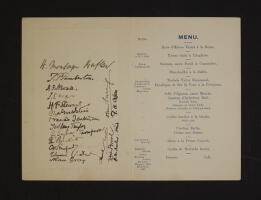Menu for dinner signed by the Master H. M. Butler, T. P. Pemberton, H. F. Newall, H. F. Stewart, Charles Waldstein, Francis Jenkinson, Sedley Taylor, E. Seymer Thompson, F. C. Burkitt, Charles Villiers Stanford, Edward J. Dent, Alan Gray, Charles Wood, Karl Breul, R. D. Archer-Hind, Oscar Browning, [G. H. Orpen?], and J. E. Nixon.
Letter dated 27 Feb. 1911 from Laura Archer-Hind contains details of Richard Archer-Hind's life. Accompanied by the obituary of Archer-Hind in The Cambridge Review April 28, 1910 and another cutting, an entry in a biographical dictionary.
c/o Miss Ellis, 51 Clarendon Avenue, Leamington Spa - Is surprised by his silence after his letter in September with his criticism of Frazer for proposing to publish his fellowship dissertation without adding an introduction acknowledging the work done by other scholars in the 50 years since writing it, thinks he ought not publish juvenilia and parerga; in the eighties and nineties was in much contact with the Cambridge Platonists, and points out the activity of the last 25 years, apart from the 'Big Three' of Britain: [Henry] Jackson, [John] Burnet, and A. E. Taylor, there is Lutosławski the Pole and Svoboda the Czecho-slovak, and many others in Germany, discusses the theories, hears from [Robert] Hicks that Taylor ignores Archer-Hind; given the massive changes in the field he felt obliged to write the letter, if he does not receive a reply to this one in a week, he will send a telegram; their new maid is hopeless; his sister Anne is very weak and ailing.
c/o Miss Ellis, 51 Clarendon Avenue, Leamington Spa. Dated 24 February, 1929 - Is surprised by his silence after his letter in September with his criticism of Frazer for proposing to publish his fellowship dissertation without adding an introduction acknowledging the work done by other scholars in the 50 years since writing it, thinks he ought not publish juvenilia and parerga; in the eighties and nineties was in much contact with the Cambridge Platonists, and points out the activity of the last 25 years, apart from the 'Big Three' of Britain: [Henry] Jackson, [John] Burnet, and A. E. Taylor, there is Lutosławski the Pole and Svoboda the Czecho-slovak, and many others in Germany, discusses the theories, hears from Hicks that Taylor ignores Archer-Hind; given the massive changes in the field he felt obliged to write the letter, if he does not receive a reply to this one in a week, he will send a telegram; their new maid is hopeless; his sister Anne is very weak and ailing.
Little Newnham, Cambridge - Thinks there is no valid objection to the admission of women; corrects his statement that Lord Kelvin was ready to sign: he hears he is not.
Expresses his gratitude for Ward's having called his attention 'to the dialogue between Henry Sidgwick and John Grote in the C[lassical] R[eview] for March 1889' [“A Discussion Between Professor Henry Sidgwick and the Late Professor John Grote, on the Utilitarian Basis of Plato's Republic.” (1889) 3 Classical Review 97], and hopes that he will see his way to publishing it. Refers to the fact that Sidgwick always had an interest in the subject and 'always comes to this question from the point of view of ancient ethics.' Finds it surprising that he never read that 'curious paper', and reports that he 'read with great care [ ] Wilson's mendacious attack upon Archer Hind.' Explains that at the time, however, he had been very busy, and had completely forgotten that the paper had appeared. Remarks that 'anything of Sidgwick's about ancient ethics ought to be considered', since it always seemed to him that the subject 'had an especial fascination for him, and brought out in full force his critical quality.' Returns with the letter the copy of the Classical Review [not included]. Also expresses his gratitude to Ward for his having given him his paper 'on the [ ] of psychology', which he 'shall read with all the more interest' because he is lecturing on [Aristotle's?] De Anima and believes that the paper will very directly bear upon that subject.
Jackson, Henry (1839-1921), classical scholarContaining copy of Harry Chester Goodhart's Latin translation of Edward FitzGerald verses: 'Ah my Beloved, fill the Cup that cheers... / Fundere quid cesses laticem, mea vita, Lyaeum?'.
